
Current Events :













You must be aware that the Income Tax Department has recently issued a cautionary advisory to the salaried taxpayers that those suppressing information while filing their income tax returns (ITRs) will be penalised, followed by prosecution as well. One of the reasons being that many taxpayers increase their deductions or exemptions or reduce their taxable income while filing their ITRs in order to reduce their tax liability. However, hiding one’s income details from the I-T Department is not possible now-a-days. Therefore, if you want to avoid being labelled an income tax evader by taxmen, you are required to do certain things and also need to file your tax returns carefully from now on. Here are a few points you should keep in mind:
1. Avoid claiming false deductions
It has been observed that in order to increase the amount of refund, some people claim bogus deductions under various sections of Chapter VI-A. “However, one should not reduce one’s income in the ITR by availing false deductions. If the I-T Department finds any discrepancy in your ITR, then it will scrutinize your case in detail and levy penalties upon you, followed by prosecution as per the provisions of the law,” says CA Abhishek Soni, Founder, tax2win.in.
2. Avoid inflating interest on home loan repayment
In ITRs, many people claim more amount of interest on home loans than mentioned in their interest certificate. In that case, the tax department may ask you to submit relevant proofs. If it finds the proofs to be insufficient, then it can take penal action against you. Therefore, do not try to inflate the claim of interest paid on home loan.
3. Avoid mistake in case of multiple Form 16s
If you have changed your job/jobs during the year, you will need to refer to multiple Form 16s along with your Form 26AS while filing your income tax return. “The tax department has all the data related to salary income and TDS deducted on it. So, you must combine your income from all the employers and calculate the amount of tax. Then subtract the TDS, which has already been deducted, from the total tax. Resultantly, you will get to know if you need to pay more tax,” says Soni.
4. Avoid claiming false tax exemptions
Several people claim false tax exemptions under Section 10 like HRA, LTA, medical reimbursement, etc. These can be easily identified by comparing data in the tax return with Form 16, Form 16A and Form 26AS. Also, the new ITR forms require you to provide the break-up of your salary, all taxable allowances and perquisites etc. Therefore, try to save tax only by availing valid tax benefits.
5. Avoid fake claims of capital gains
If you have any income or loss from trading of Shares or Future and Options, then do not forget to include it in your ITR. “Since all your financial accounts are linked to Aadhaar and PAN, so the I-T Department can easily compare the gains made by you in trading in equity or MFs with that reported in your return and any under reporting or miss-reporting can lead you in trouble,” informs Soni.
6. Avoid exclusion of rent on housing property
If a person owns more than one house, then he should calculate and add the notional rent/ actual rent of the deemed let out property in his taxable income and pay due taxes on it. “Many taxpayers are either not aware of this clause or ignore it to save taxes. Now, since all the properties are linked to your PAN and Aadhaar, the I-T Department can easily verify them. In case it is found that you have under-reported your income, then it can result into penal action,” says CA Vertika Kedia, Co-Founder, Tax2win.in.
7. Avoid exclusion of agriculture income
Very few taxpayers know that agricultural income, which is not subject to income tax, is also added to your taxable income to decide the tax rate applicable on your total income. If you do not account for it, then the taxmen may compare your agricultural income with land revenue records.
8. Avoid exclusion of interest income
Depositing your hard-earned money in banks either in savings account or FDs always seems a secure and easy option. However, many taxpayers tend to forget to include the interest income earned from those fixed deposits and savings bank account in their ITRs. Avoidance of it may land you into trouble, and the I-T Department may issue notices in such regard.
To Conclude…
Keeping all the above-mentioned points in view, it is clear that under-reporting or misreporting your income to the I-T Department or adopting any malpractice to evade tax may cost you dearly. Therefore, be vigilant while filing your I-T returns to avoid being labelled a tax evader.
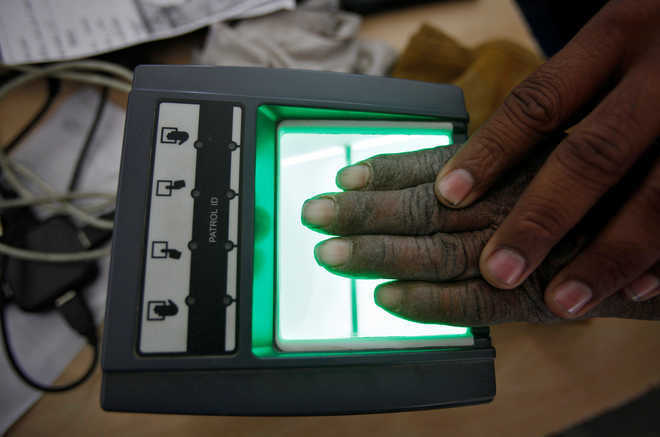
It had become clear last month that linking your Aadhaar number with mobile phones or bank accounts was not mandatory, at least till the matter was resolved in the Supreme Court. However, on Wednesday, the government was taken to task by the court for claiming in the public domain that the mobile linking was required under orders of the Apex court. It defies comprehension as to why the government would have invited the embarrassment upon itself when it is not in a position to enforce the order as yet. The same is true for PAN.As things began, citizens were fine till Aaadhar linkage was limited to those drawing subsidies from the treasury and left out those who didn’t. However, on ground people are being asked to give the Aadhaar number for everything from school admission to getting a marriage certificate. Lack of awareness is leading to most people complying with the unwarranted requirement, or stand losing a benefit. This is wholly unjustified and illegal denial of services. Both the state and Central governments should thus come out with a positive list of services that require the Aadhaar; but before that they will have to ensure the demand has a legal basis. Anything outside those lists may then be ignored by people till the matter is settled.The government, defending its case in the Supreme Court, has said that banks and phone companies have more data on clients than the UIDAI even without the Aadhaar linking, so the question of privacy being violated by Aadhaar does not arise. There is truth in the statement to the extent that all of this is part of the larger digital cloud that is gathering over the private citizen, who is steadily losing his privacy; ‘whataboutery’ will not change that fact. Unfortunately, to what extent this global intrusion may go is something that is likely to be settled more by way of might, whether legal or financial, than a nuanced debate within jurisprudence. Certain rights laid down in the Constitution may well end up being reinterpreted.
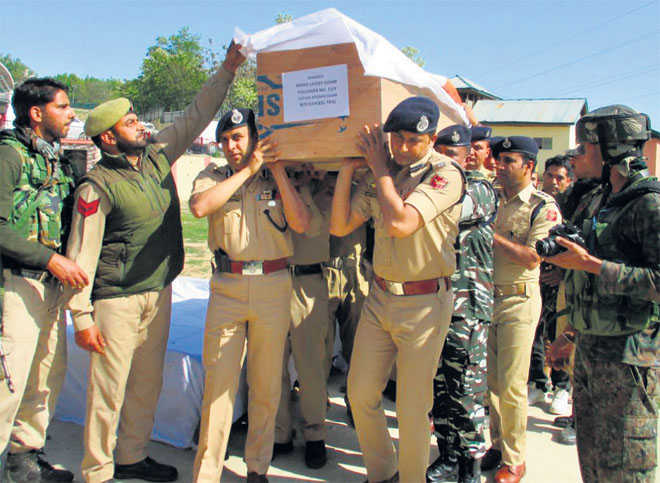
Suhail A Shah
Anantnag, April 24
Four militants, a soldier and a policeman were killed in a day-long encounter in Tral area of Pulwama district, 50 km south-east of Srinagar, on Tuesday.Police said the militants belonged to the Jaish-e-Mohammad (JeM) and their identities were being ascertained. Sources in the police said two of the slain militants were believed to be Pakistan nationals, while the other two were locals, one of them a constable’s son.The slain Army man has been identified as Sepoy Ajay Kumar of Sirmaur, Himachal Pradesh, and the policeman as Constable Lateef Ahmad Gojri from Tral.The encounter began early morning in the forest area of Laam in Tral, where security forces had initiated a search operation following a lead.“While the search was on, the militants opened heavy fire on our men, leaving an Army man injured,” a senior police official said. “The jawan succumbed to his injuries later.” After the initial fire, police sources said, the militants took cover in the dense forest. There was a lull for a few hours. The security forces then employed helicopters and para-commandos to track down the militants.“Once the militants were located, the exchange of fire resumed,” the police official said, adding that four militants and one policeman were killed during the fresh firing.The operation ended with the retrieval of the slain militants’ bodies, which were sent for medico-legal formalities. Meanwhile, clashes erupted in main town and Batpora areas of Tral soon after the operation started. The clashes continued for a while before heavy deployment of security forces brought things under control. The area remained shut throughout the day.The residents awaited the arrival of bodies of the local militants. All roads leading to Tral had been sealed and mobile Internet suspended in the area.
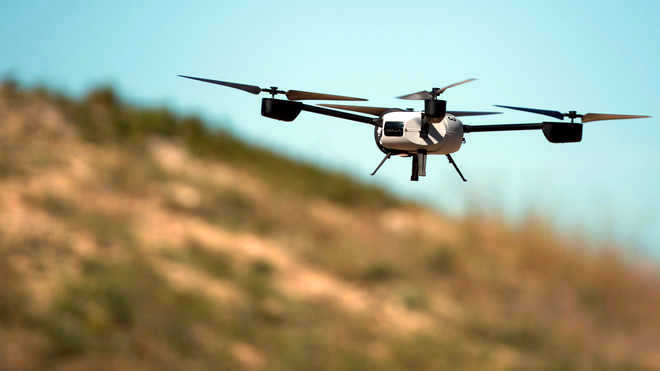
Washington, April 20
US President Donald Trump has ordered government agencies to expedite and expand arms sales abroad, including exports of advanced drones to reinforce allied armies, the White House has said, a move expected to be helpful to countries like India.Trump has also established a new administration policy on the export of American-manufactured unmanned aerial systems (UAS), White House Press Secretary Sarah Sanders said.The move is expected to be helpful to countries like India, a ‘major defence partner’ which is seeking to purchase large number of armed and surveillance drones from the US. Trump signed a national security presidential memorandum approving a new Conventional Arms Transfer (CAT) policy, Sanders said. — PTI
Around 1,500 civilians have been killed in the bombardment by Russia and the Syrian government, but many more — and the Islamist fighters opposing the regime — would have died without this secret underground warren.
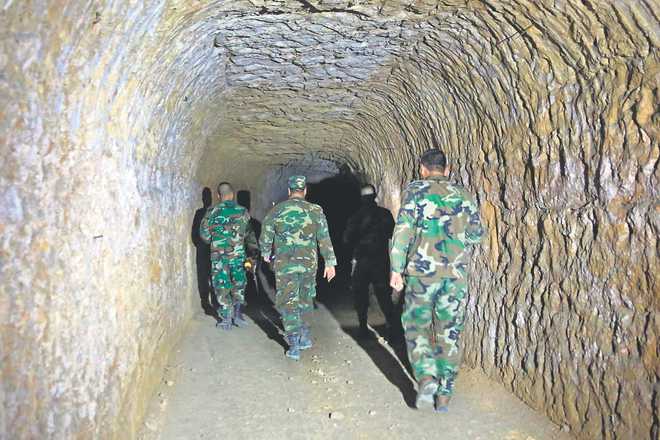
Robert Fisk
ALL battles and bombardments share their secrets one by one. Eastern Ghouta is no different. Why the sudden, savage bombardment of these Syrian towns and villages more than three weeks ago? Why the wasteland of homes and streets — and how did so many of the civilians survive, along with hundreds of Islamist gunmen? You can do no better that start your enquiry in a frontline dugout near Arbeen, on the old and now war-smashed international highway between Damascus and Aleppo. It is protected by oil barrels of solid concrete, an iron roof, a rocket-propelled grenade launcher, a couple of rifles and a rusting motorbike, presumably to carry messages when the lines were cut. “Twenty mortars a day,” one of the Syrian soldiers says, rolling his eyes.And now it is over, he hopes. But — aside from the oil lamps and the cups of ‘mutta’ tea what catches your attention is the absence of a single trench.The soldiers sport beards like the French ‘poilu’ in the Great War a hundred years ago. But they dig no trenches. Not a single communications alleyway winds through the dirt and mud on either side of the dugout to give the running messenger cover from those mortars. Maybe the motorbike increased their chances. The lattice of trenches and revetments — dug so deeply a century ago by the Brits, French and Germans — has never caught on in Syria.Thus, Syrian soldiers were shocked to find how safe their enemies were. These tunnels of great stoneworks — for they were carved through the living rock, supposedly by Palestinians on loan from Hamas, men who had spent years hacking tunnels between Gaza and the Egyptian desert — have become a familiar part of the Syrian war. In Homs, the makers carved their names on the walls like Victorian railway builders, and in eastern Aleppo. These tunnels carry inside them the necrology of ideas, the ideological martyrs’ cemetery of their makers’ minds. They are deep and dank and moist. But they are safe.So here comes the latest little secret of the Ghouta war. The Syrian aircraft — so often blamed for the indiscriminate nature of a bombing campaign which, according to many reports, has killed 1,500 civilians in eastern Ghouta — were old. But the Russian aircraft were also old Sukhoi 24s. A Russian source says: “The bombs we used in Ghouta were not ‘smart’ bombs with full computer guidance. Maybe some. But most had a variable of 50 metres off target.” In other words, you can forget the old claim of “pinpoint” accuracy which Western armies also like to adopt. These Russian bombs launched against eastern Ghouta had a spread pattern of 150 feet each side of what the pilots were aiming at; which means a house instead of an anti-aircraft gun. Or one house rather than another house. And anyone inside.But these blockbusters, it seems, couldn’t bust any blocks. The tunnels were never breached. That’s why they were built. They were bomb-proof. And thus the Russians and Syrians fired more and more bombs to break them. The Islamist groups in Ghouta did not have barracks or dugouts, for they lived in the tunnels, ate in the tunnels, fought, briefly, in daylight outside the tunnels, and then dragged their mortars back inside. A fighter wishes to pray: he can take the tunnel to the mosque. He needs surgery? He can be taken between those glistening walls to the hospital. He needs to move to a new battlefront, he takes a mile or two walk across town. Underground.The Syrians paid for their advance. In one short battle, at least 20 of them were killed. During another, five men emerged from the ruins, all dressed in Syrian army uniform and carrying weapons, well shaved, saying they were “coming across” to the Syrian lines. Several Syrian soldiers captured years ago were still held hostage by Islamists in underground cells. But the ‘Nimr’ units, while they knew the uniforms were real, looked closely at the faces of the men wearing them. “They could see they were newly shaved, that they weren’t so tanned on their chins as on the rest of their faces, and they realised they were Jaish al-Islam men dressed in Syrian uniform who had just removed their beards,” the eyewitness added bleakly. “They killed them all.”So why the ferocity of the bombardment? That Russian source believes that the Russian president wanted to end the Syrian war, especially the Ghouta conflict, before his election. But this proved impossible. Syria doesn’t fit the familiar ‘quagmire’ of Vietnam legend; it is a vast terrain of captured and recaptured and re-recaptured towns and villages, which moves with the power of the antagonists. The Russians can pick and choose their battles. This increases mobility. But it doesn’t create the exit home.There are streets in Ghouta, incredibly enough, whose buildings are still standing relatively unscathed. They were spared during the bombardment because their inhabitants said they wanted to stay in their homes and would not resist the Syrian army. Thousands of Syrians in Ghouta have thus not joined the refugee buses nor accompanied the women and children travelling with their jihadi menfolk to Idlib. They are still living at home.You might not think this, staring over the miles of wreckage, grey, powdered, roof upon pancaked roof. But then you wouldn’t imagine the tunnels either. The Syrians were amazed at them. So were the Moscow military men guarding the Russian Centre for Reconciliation inside Ghouta. That’s where the convoys are put together on paper and lists and buses numbered for evacuation, where the Islamist groups bargain for freedom with or without weapons, for ‘reconciliation’ or for a temporary Russian presence in their streets – even for local authorities run by Islamist political groups instead of by armed men. The Syrians have spotted the trick in this one, of course. Try to take back the land from the ‘local authorities’ and the Islamists will spring mushroom-like from the ground again, along with their weapons. And perhaps from undiscovered tunnels.
‘There are tunnels everywhere’
An eyewitness who entered the ruins after Syrian assault units burst through the tunnels towards Douma said, “I have never seen so many tunnels. They had built tunnels everywhere. They were deep and they ran beneath shops and mosques and hospitals and homes and apartment blocks and roads and fields. I went into one with full electric lighting, the lamps strung out for hundreds of yards. I walked half a mile through it. They were safe there. So were the civilians who hid in the same tunnels.”
By arrangement with Independent
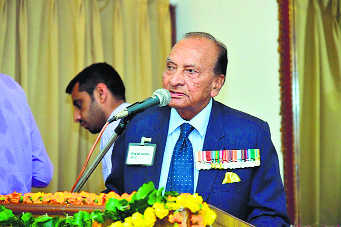
There are heroes and there are heroes. So goes the popular perception of bravehearts. In the military sense, heroism is often an event, an episode or a happening quite often unplanned but sometimes planned as well. This is when there is an opportunity; a chance to do something unexpected; something out-of-the-box; something extraordinary either individually or in a buddy pair, sub-team or team action. The soldier gets involved in a manner led by gut instinct, grit, enterprise, cold courage tested almost always against impossible odds. Such a braveheart is led by selflessness and unit/country-first ideals… always and every time.So, there are heroes and there are heroes. By implication, this means that some heroes rise above heroism itself. When they do, they need to be respected, admired; placed on an altar where only the finest examples of humanity belong: deathless heroes. I was proud to come across one such person: Brig NS Sandhu, MVC.Then Lt Col NS Sandhu was in command of 10 Dogra in the climacteric Battle of Dera Baba Nanak (DBN) during the 1971 Indo-Pak war. This 3 Cavalry veteran of the Battle of Khemkaran (1965 Indo-Pak war) had, as a Major, delivered a gritty performance during that battle (his ‘C’ squadron destroyed 14 Patton tanks) which saved Punjab for India. As CO of 10 Dogra, he handled the enormously complex challenge of capturing the strategically important DBN Bridge as only a high-grade war veteran could — with admirable presence of mind, courage, coolness and situational awareness.Everything that could go wrong went wrong but Lt Col Sandhu was that kind of person who brought order to a convoluted battlefield situation rapidly spiraling out of control. He did this on a pitch-dark night amidst elephant grass (sarkanda)-driven disorientation of vital battlefield force-multipliers; accurate enemy ground fire and artillery fire. He did the right thing — he took charge leading from the front. He handled the amorphous battlefield situation with the instinct of a seasoned veteran instead of ‘taking counsel of his fears’; an escapism which the iconic British-Indian General, Bill Slim, had learnt to avoid while assiduously converting ‘defeat into victory’ in Burma during World War II.Narinder Sandhu too achieved spectacular success despite casualties to his officers/men and he himself getting wounded. It came as no surprise when the DBN Bridge was captured by 10 Dogra on the misty morning of December 6, 1971. Equally unsurprising was the award of Maha Vir Chakra to Lt Col Sandhu for his exceptional leadership.This was a straight-legged narration of the officer’s heroic acts in two successive wars, but we were talking about a bit more; about deathless heroism, remember?November 22, 2016 was a day which the young Research Team members of the Directorate of Defence Services Welfare, Punjab, are unlikely to forget in a hurry. On this day, Brig NS Sandhu was host to the Research Team at his gracious, well-appointed home in Chandigarh. The association of young researchers with this real life hero goes back to the time in early 2015 when the Punjab State War Heroes Memorial and Museum research work began with initially raw research rookies on board. He was one eagerly awaited veteran who always met them with a smile, encouraged them with kind, motivational words, leaving them spell-bound.The meeting on November 22 was therefore planned as a brief ‘get well sir’ visit to check on their mentor’s health which, they were aware, had been under severe stress and scrutiny.Dressed in a French grey jacket-and-black-trouser combination with a peach pocket square and attitude to match, Brig Sandhu was waiting on his lawn with a smile that matched his jaunty pocket square. Expecting to find him bed-ridden and surrounded by tubes and catheters, the Research Team was far too shocked to ask about his well-being because the inquiry seemed so irrelevant. It was only later that the young researchers learnt, albeit reluctantly, from their deathless hero how he had combated grave health-related adversity without losing his infectious smile, composure or equanimity.There are real life heroes after all… and a few of them are deathless.
Tribune News Service
New Delhi, March 31
The Indian Army has formalised a procedure that will allow Indian private companies to work on existing weapons and equipment to suggest modifications and improvements.These companies will be allowed to work on ‘in-service’ equipment. The Vice-Chief of the Army will be approving the authorisation for handing over the service equipment. An advisory support committee will assist him.The equipment can be handed over for a year, extendable by six months, said the new protocol.The companies can modify, upgrade and even provide substitution of whole equipment or its sub-assemblies.The idea is to see that private industry and the academia gets access to military equipment to help in innovating the design, integrating additional systems and developing new variants.
Pakistan’s vulnerability to USled sanctions is apparent from its struggle to stave off a default
Debt-ridden Pakistan is very vulnerable to Western sanctions, yet it is unclear whether US President Donald Trump’s administration is willing to squeeze it financially in a way that could help reform its behaviour. Washington also seems reluctant to strip Pakistan of its status as a Major Non-NATO Ally (MNNA) or target its military for creating transnational terrorists.
The main driver of Pakistan’s nexus with terrorists is its powerful military, whose generals hold decisive power and dictate terms to a largely helpless government. With the military’s rogue Inter-Services Intelligence (ISI) rearing terrorists, Pakistan has long played a double game, pretending to be America’s ally while aiding its most deadly foes that have killed or maimed thousands of US soldiers in Afghanistan. Pakistani forces only target terrorists that fall out of line or threaten Pakistan itself.
The recent media attention on the multilateral Financial Action Task Force’s planned action against Pakistan obscured that country’s success in preserving its status for another two years under the European Union’s preferential trading (GSP+) programme. Pakistan is the number one beneficiary of the GSP+ programme, which grants Pakistani exporters, especially of textiles, tariff-free access to the EU market in exchange for the country improving its human rights and governance. In effect, GSP+ rewards a sponsor of terror whose human-rights record has only worsened.
Trump’s suspension of most military aid to Pakistan is unlikely by itself to force a change in the behaviour of a country that counts China and Saudi Arabia as its benefactors. Only escalating American pressure through graduated sanctions can make Pakistan alter its cost-benefit calculation in propping up militant groups that have helped turn Afghanistan into a virtually failed state, where the US is stuck in the longest and most expensive war in its history. The US failure to take the war into Pakistan’s territory has resulted in even Kabul coming under siege.
Yet, swayed by geopolitical considerations, the US has long been reluctant to hold the Pakistani generals accountable for the American blood on their hands. Indeed, Washington for years funded the Pakistani military and turned Pakistan into one of its largest aid recipients.
Even when the US, after a 10-year hunt, found Osama bin Laden holed up in a compound next to Pakistan’s main military academy, it did not abandon its carrots-only strategy. Such an approach has only helped the military tighten its grip on Pakistan, thwarting any movement toward a genuine democratic transition.
Worse still, the US has dissuaded India from imposing any sanctions on Pakistan. If anything, India has been pressured to stay engaged with Pakistan, which explains the secret meetings the national security adviser has had with his Pakistani counterpart in Bangkok and elsewhere. The recent launch, with US backing, of the Turkmenistan-Afghanistan-Pakistan-India (TAPI) gas pipeline project illustrates why it is difficult for India to impose even diplomatic sanctions on Pakistan.
To be sure, the Trump administration is searching for a new strategy on Pakistan. Yet it is an open question whether it will go beyond the security aid suspension, which excludes economic assistance and military training. Aid suspension in the past has failed to change Pakistan’s behaviour.
With Washington loath to label Pakistan a state sponsor of terrorism, it must at least strip that country of its MNNA status, an action that will end its preferential access to US weapons and technologies and deny it the financial and diplomatic benefits associated with that designation.
To force Pakistani generals to cut their nexus with terrorists, American sanctions should target some of them, including debarring them and their family members from the US and freezing their assets. Among the half a million Pakistanis living in the US are the sons and daughters of many senior Pakistani military officers.
Pakistan’s vulnerability to potential US-led sanctions is apparent from its ongoing struggle to stave off a default. Despite China’s strategic penetration of Pakistan, the United States is still the biggest importer of Pakistani goods and services.
US financial and trade sanctions extending to multilateral lending, as well as suspension of military spare parts, can force Pakistan to clean up its act.
To end Pakistan’s double game on terrorism, Washington will have to halt its own double game of rewarding or subsidising a country that, in Trump’s own words, has given the United States “nothing but lies and deceit”. To address a self-made problem, it is high time for US policymakers to put their money where their mouths are.

























































